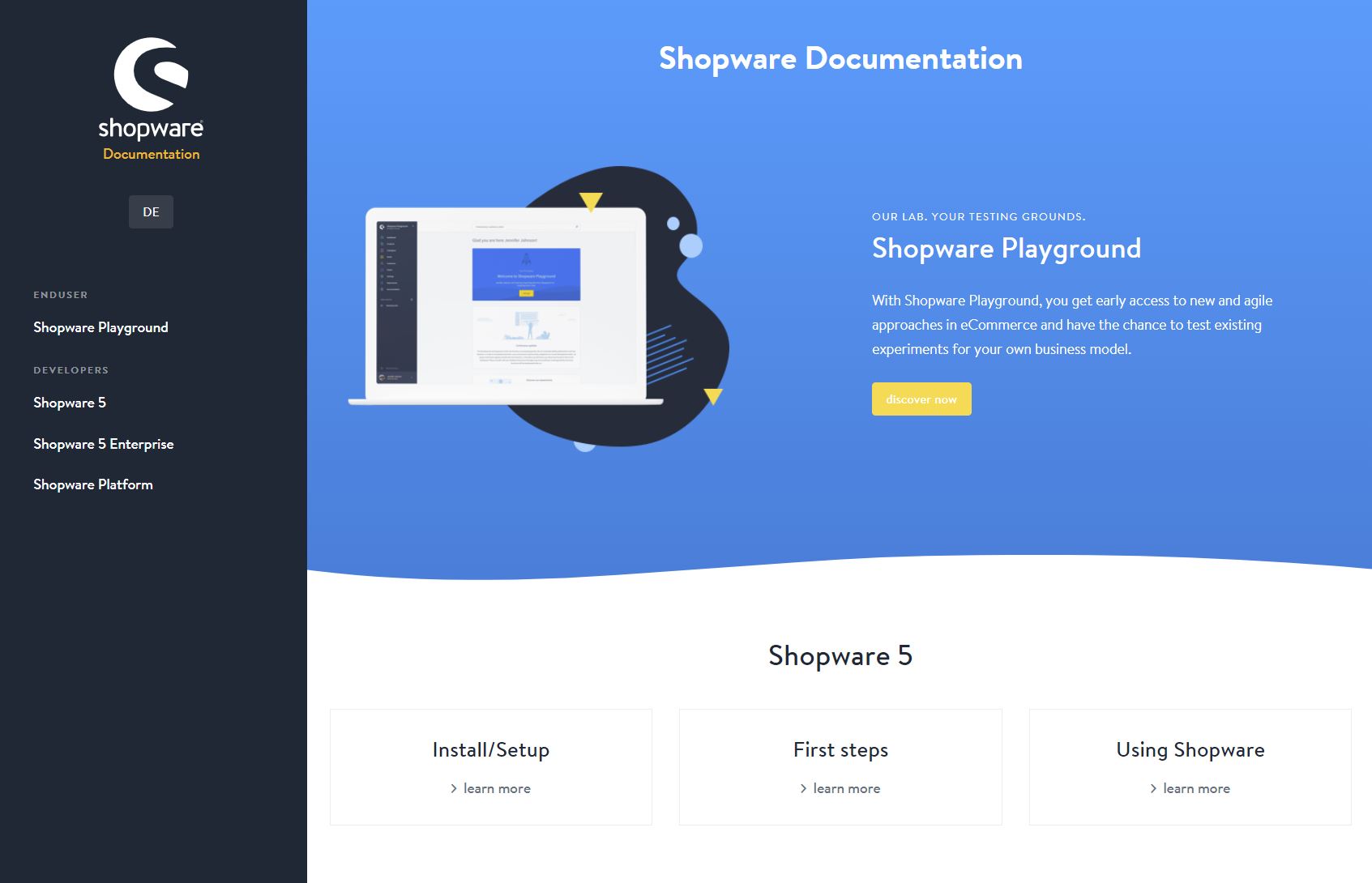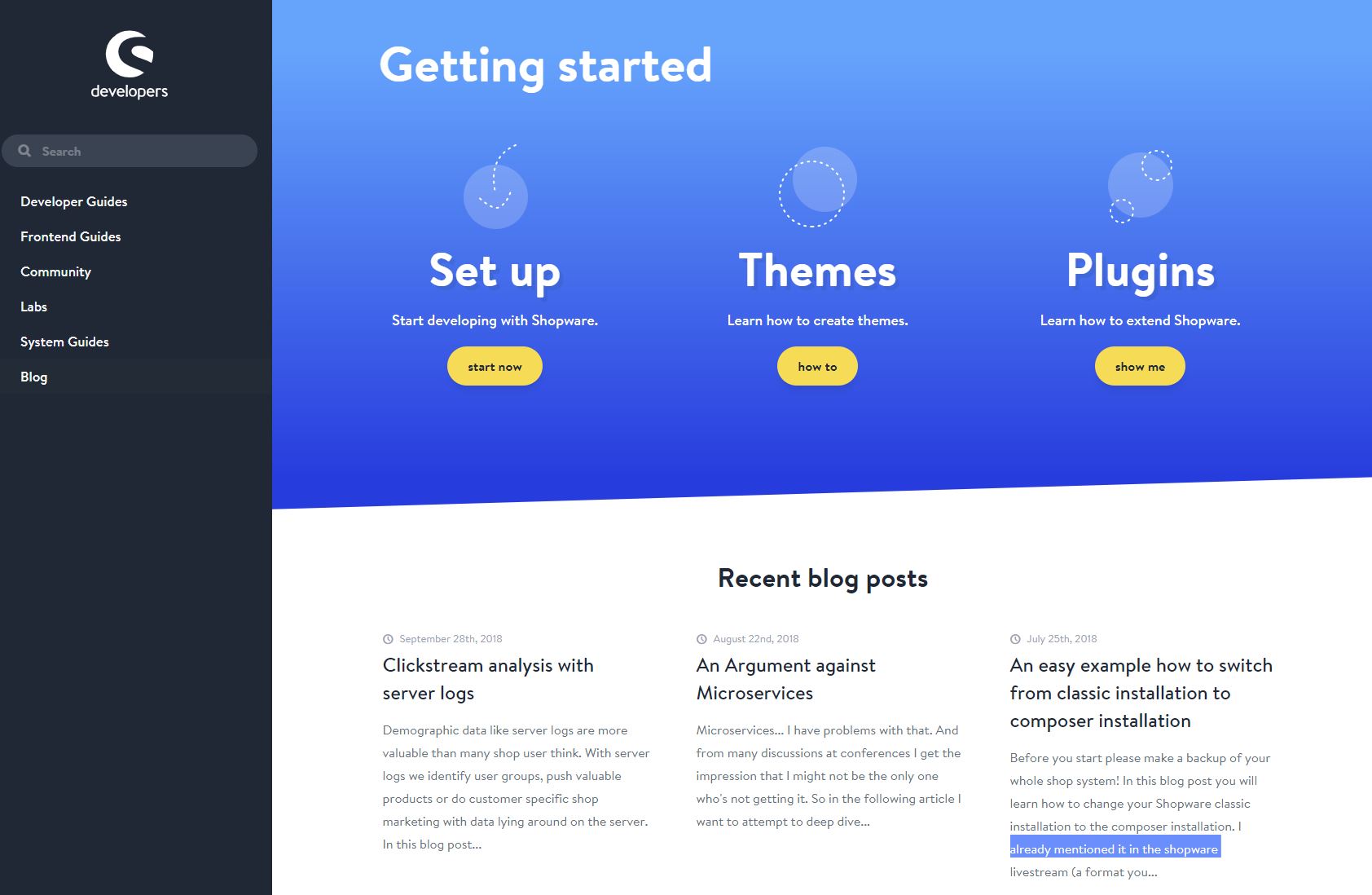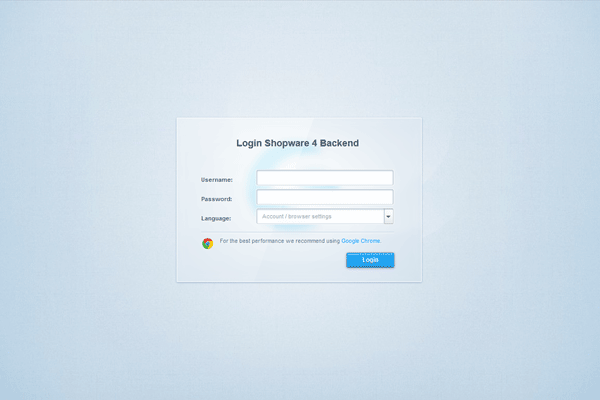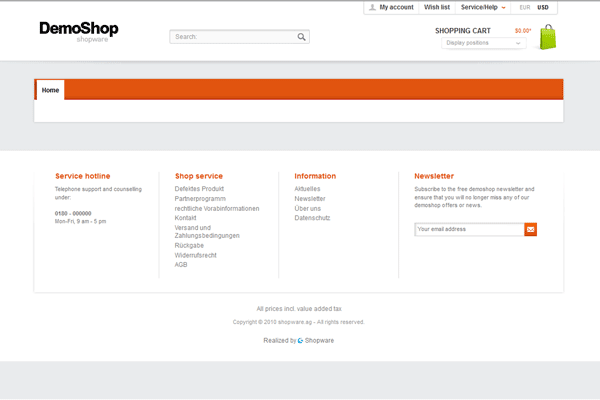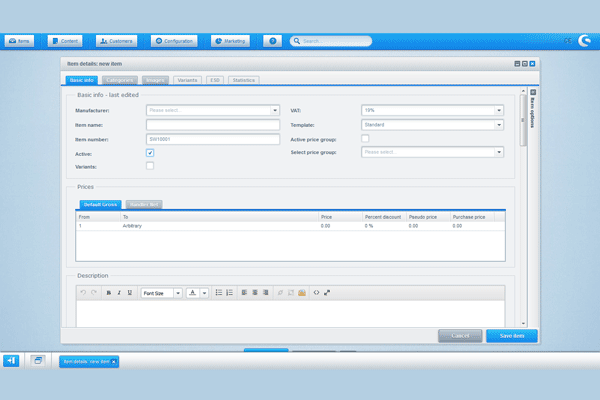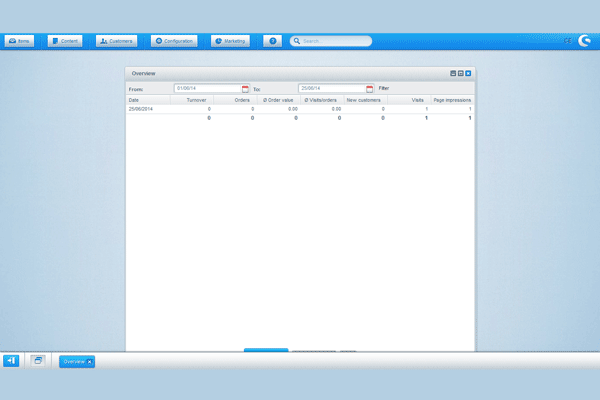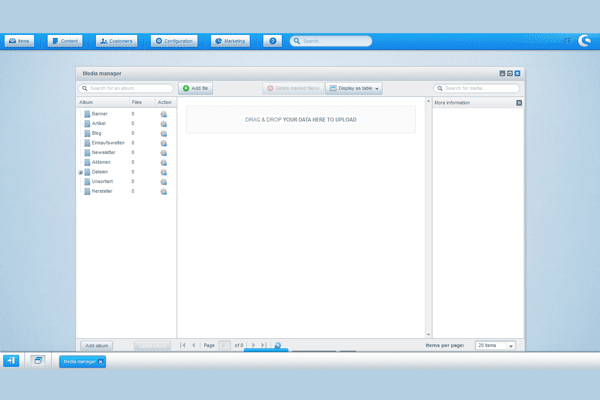1-click AWS Deployment 1-click Azure Deployment
Overview
Shopware is an enterprise-level eCommerce platform, renowned for having the most live stores in Germany and also for powering some of the largest online stores in the market. Shopware is now starting to enter new European territories and is making big treads in the UK. Shopware is an established and extremely capable of scaling at an enterprise-level, with some existing customers handling huge traffic points and uplifts in orders. Some of the features that support this scalability include a varnish cache, built-in usage of Apache JMeter clustering tools and the on-going platform support you get as part of the licensing with Shopware Enterprise. The reduced input needed from the merchant around scaling is something that Shopware see as a key differentiator, similar to platforms like Salesforce Commerce Cloud Shopware also has the skill to add servers for explicit tasks, which allows for further scale and better acceptance times.
Shopware Homepage
On Shopware homepage one will find all significant info about our product, comparison of versions and opportunities to contact us. Besides the partner list, which offers you an easy way to find a fitting agency, to assist you with your necessities, you also get an overview about the training possibilities of Shopware. Also, you have a blog with all news, case studies and many more information.
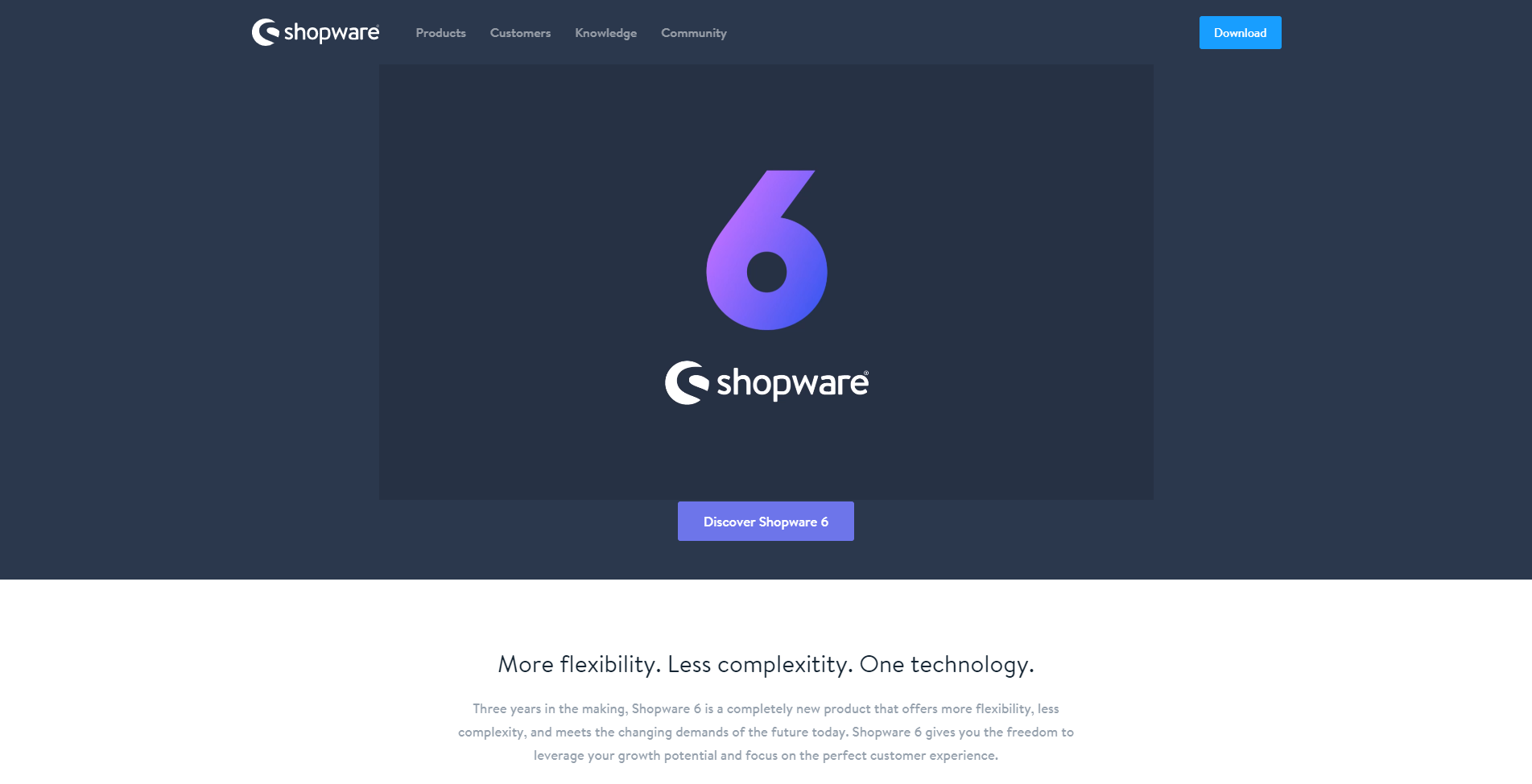
Shopware Community Store
If you want to extend your shop with functions not available by default our community store is the right spot to look at! Here different shopware manufacturers offer their individual extends for the shop software. Besides payment-interfaces you find many useful tools to optimize your individual onlineshop. If you might have a extension of shopware yourself you want to offer other customers you are also right here!

Shopware Account
The Shopware account is the main spot of the Shopware universe. Here you can look at your purchases and invoices, change your entered data or ask questions to the official Shopware support. The licence overview offers you a compact display of all your licences and extensions you bought from us.

Shopware Docs – our knowledge database
Here you find articles that help you configure your shop, create products or deal with problems. Besides, you find the download overview including information about the Shopware versions, evaluation software and updates. The Shopware roadmap is also displayed transparently and visible for everyone on the roadmap-page.
Shopware Forum
As the main page of our community the wiki page also contains the forum access. There you can share experiences and get in touch with other shop operators.

Shopware Devdocs
As a developer or web-designer this is your area. This page contains all information about the technique behind Shopware and how to extend it. If you want to implement your own plugin or want to realise a simple design change you find multiple examples in our developer documentation to support you with the task at hand. Additionally you find another blog here that offers you further information out of the shopware environment.
Shopware Issue Tracker
We hope you do not have to visit this page very often. Our issue tracker is meant for you to tell us about global errors in our software. If you have a problem you can also reproduce in one of our demoshops you have the possibility to report this in the issue tracker. The tickets are then checked by our developers and prioritised to offer you a preferably error free product.

Now that you have installed Shopware, we will take the first steps together in your new system.
First Run Wizard
Languages
At the first step the wizard shows you all available language plugins for your Shopware version. These plugins are community driven translation of the Shopware snippets, so it’s backend and frontend. If you setup your shop for one of these countries, you can just install the desired plugin.


When you install a language plugin and proceed, the wizard asks if you want to switch the wizard to the downloaded language. Alternatively you can also switch to german or continue in english.

Demo data
Here you can install demo data for testing purposes. When you installed Shopware for a production environment, we don’t recommend to install demodata, but for test environments you can install these data here as a plugin.

Recommendations
These are arerecommendations from Shopware which may be helpful for you. If needed, you can install them directly:

Further you will see Country-specific recommendations, this are plugins, which will be used often in the desired country. Just select your country to get an overview of the available plugins and install one, if needed.

Configuration
In the area Shop settings you can set the basic informations of your shop like the name, e-mail address, address, bank details and the company.In the Theme configuration you can set the primary and secondary color of your theme and the shop logo. Primary for example are Buttons, active and primary links and headings while secondary are secondary buttons, running text and other links.

The set Shop logo is used for all viewports by default. if you want to set divergent logos for single viewports, you can do this afterwards in the Theme Manager.Mind the image size! While the theme and the most webmailers will display it correctly, applications like Outlook will display the image in full size, because they cannot interpret the related CSS property.
Done
The wizard is finished now and he shows you further steps to go: Visit the Community Store, create a Shopware Account, visit the forum or open the documentation. By clicking Finish you complete the wizard and will be forwarded into the Shopware backend.

Revisiting the wizard
If you want to revisit the wizard, you can reactivate it using the basic settings in Configuration > Basic settings > System > Backend by activating the First Run Wizard-option and clear the cache. After reloading the backend the wizard will show up again

Shopware is a highly flexible, powerful and customizable software solution that allows you to quickly and easily create an online shop, regardless of your store requirements.
Shopware is based on novel eCommerce technologies, provides highly innovative marketing tools and includes integrated SEO functionalities, all of which are the basis for any successful online business. An intuitive interface and simple-to-use backend make the software the optimal choice for users, as well as designers, developers and decision makers.
Login
Home
Details
Overview
Add Files
Shopware Community Edition is licensed under the terms of Affero General Public License version 3 (AGPLv3).
Features
Some of the core features that Shopware are as follows:
Product catalog management and merchandising
The retailing competences in Shopware are very alike to Magento Enterprise, in that you can create rules based on attributes to automate the process. This fundamentally means that you can use the data that is being used in attributes to boost different products based on the criteria set – so it could be that you promote your own-brand products above other brands, or products with a higher margin over drop-shipped items. These are just a few examples, but rule-based merchandising is certainly useful for merchants with larger stores.
Most of the features around catalog setup and management are similar to Magento, in terms of the core product types The simple > configurable management is slightly different, in that they’re referred to as variants and managed at a product-level (just create variants). The product setup looks straightforward and the standard fields are again, very similar to Magento. The CSV import / export is also similar and appears to be stable.
Shop ware’s search is a big strength for them, particularly over the search solutions from Magento and Salesforce Commerce Cloud. Although the under-lying technology doesn’t necessarily match some of the premium solutions on the market, they have a huge amount of strong features out of the box and the default look and feel is also very strong. The Enterprise search solution allows for very advanced rule-based merchandising, indexing of lots of different types of content (e.g. products, blog posts, CMS pages, categories etc) and various other features around managing synonyms and individual keywords.
Content & Commerce / Shopware Shopping World
Shopware’s CMS / Shopping World is likely to be the biggest selling point for a lot of retailers – allowing users to create highly flexible content pages with all of the core components they could possibly need. A user can drag and drop things like products, product blocks, banners, videos, content blocks, blog posts, guides, carousels etc and create a completely custom layout – this is something that will definitely appeal to people either using or looking to use a Hybris solution (e.g. Magento + Drupal).
The screenshot below shows how a product stream is used to provide a list of products as a collapsable overlay, over a banner image. Shopware also has a built-in blog, which provides all of the core blogging features. It’s not on the same level as WordPress, but it’s a really good, simple starting point.
Third-party integrations
Due to their presence in Germany, Shopware already have a lot of existing integrations with popular third-party solutions, but more with the international systems (as opposed to solely UK-based companies). Some examples of popular / common integrations that already exist include SAP, Microsoft Dynamics, NOSTO, dotmailer, Stripe, WordPress, PayPal, Klarna, Ingenico, Skrill, Avalara, Adyen, Braintree and Worldpay.
In addition to existing third party integrations, Shopware also have various APIs that allow for custom integration with other systems. Again, the support from Shopware can help here as they will be able to advise around custom third party integrations.
Support
Shopware’s support offering is very different to Magento, in that you pay a monthly fee for application support, which can be used by the systems integrator or your internal team. The support offering is far more of a pro-active, enterprise-level relationship focused on making your store scalable and ensuring that it runs in an optimum way. Based on the conversations I’ve had with Shopware merchants and agencies, the support is one of the biggest selling points of Shopware Enterprise, due to the speed and quality of the technical support.
As part of your Shopware Enterprise license fee you’d have an assigned Technical Account Manager, who would be able to support general queries, as well as just issues and Shopware queries.
If you were to launch a Shopware Enterprise store, you’d generally have a BAU / development support retainer with the development agency, as well as the platform-level support with Shopware. For enterprise-level retailers, I think this level of support is important and it seems that they’re trying to be more in-line with someone like Salesforce Commerce Cloud (different business model entirely – based on shared revenue), with the level of support provided (as opposed to Magento).
Shopware Dealer integration
Shopware’s dealer integration module (comes at an additional cost to the enterprise license) is a very strong solution, essentially allowing for a merchant to create and manage storefronts for resellers and drop-shippers. Euronics is a good example of a Shopware merchant that uses this functionality, managing hundreds of supplier relationships – with the resellers using a unified product catalog and functionality, with Euronics then managing individual elements such as price, availability etc.
This is something that the other platforms wouldn’t offer out of the box and I would say it has potential to meet a lot of needs that would’ve previously required heavy customisation.
Customer streams
Customer streams are essentially very similar to customer segments in Magento – allowing for customer segments to be grouped via set attributes as well as criteria that can be defined and assigned automatically.
For example you could set a customer stream filter for users who have completed a purchase via a mobile device and are younger than 30. New users who then meet these criteria or existing customers who newly meet these criteria will then automatically be added to the customer stream.
Users can then assign different templates, banners etc and limit the use of vouchers, newsletters and promotions to different customer streams. This is a very good feature that is very easy to use in Shopware. You can also report on these customer streams.
B2B capabilities
Shopware’s B2B module comes at an additional cost (even for enterprise users), however the features included are stronger than a lot of the competitor solutions. Things like customer groups and assigning different pricing, availability, promotions etc at this level are out of the box Shopware, however more advanced capabilities that are available within the B2B module include:
– Customer budget management – each B2B customer would have the ability to set a budget (daily, weekly, monthly, annual, fiscal or custom) and order against that number (with reporting and order prevention) – they can then also set ordering and budget limits against individual members of the team.
– Full B2B API available for integrations with third parties (ERP, OMS, WMS etc)
– Private shopping
– Ability to create and use different themes at a customer level
– Ability to create individual stores at a customer level
– Quotations
Product Streams
Product streams allow users to group different products based on a set criteria – e.g. you could create a group for Nike mens trainers that are under £150. These groups of products can these be used for a number of things, such as:
– Creating categories – creating a pre-defined selection of products based on the product streams (e.g. the red Nike shoes category could be a single product stream that could then also be used for cross-sells and other promotions)
– Up-sells and cross-sells – creating collections of products that can be quickly and easily used for product recommendation blocks (e.g. the red Nike shoes example above)
– Reporting – looking at performance of a set group of items
Product streams can be used across the store, as per the screenshot below.
Category merchandising and filtering options
Shopware Enterprise 5.3 allows for advanced, rule-based merchandising – which can be conducted via pre-set rules or manually created rules (based on chosen attributes). The pre-set rules could be something like most popular, best-selling, recently added etc, whereas a custom rule could be something like items between £100 and £200 by Nike.
These rules can be assigned a boosting score, which then dictates where these items appear and how they’re promoted across a single category or a group of categories.
Custom products
Shopware also provides custom products, which are essentially very flexible and advanced configurable products, but more for things like personalised items. The custom products allow for lots of options and inputs, which can either be presents on the product detail page or via an overlay.
These products can be created with a custom user journey to make the customisation process much cleaner and easier. You can also assign additional costs to the options, as well as different images and swatches.
Promotions
Shopware’s advanced promotions features allows for very advanced promotions, which can also be used in combination with each other. You can attach very specific rules against different products, customers and once a customer has achieved a certain status. An example of a promotion that could be ran could be 50% off a pair of Nike trainers for a customer who has previously purchased the same pair of Nike trainers. Or it could be that the Nike trainers are reduced by 30% if the customer already has a pair of Nike trainers in their basket.
Shopware also has a built-in loyalty program, which can be customised to provide different levels of bonus points against different customers and products. All of this can be managed within the Shopware admin interface.
Managing multiple storefronts.
Shopware have a very similar setup to managing multiple storefronts as Magento, allowing for a hierarchical setup and management of different aspects of the stores at a global or individual storefront level. Shopware provides a single login for the management of all of the different stores you have, which could be different brands, international storefronts, B2B / B2C stores etc. You could also have a centralised login for multiple client stores. There are two routes for this which would be to use a client account (manage multiple instances) or subshops (children shops for a parent store)
A subshop is essentially a variant of a main shop, whereas a separate shop could have a completely separate catalog, tax rules, delivery methods etc.
Different users can also be given access to individual stores or all stores, depending on the rights you set. This would allow for admin users to be only given access to the store they’re responsible for, for example.
Marketing features
Shopware also has a number of out-of-the-box marketing capabilities, which include:
– Affiliate programs – This allows merchants to create a simple affiliate program, where they can create affiliates with individual codes, commission structures and amounts, different cookie details etc
– Loyalty program – Shopware also has a loyalty program which provides the ability to manually set the number of loyalty points there are rewarded based on different items, customer groups, behaviour etc
– Product reviews – Shopware also has a built-in product review program
– Reporting – Shopware also has a number of very helpful reports, providing comprehensive detail around products sold, acquisition channels, customer information, search and various other things. Shopware also track on-site behaviour.
Snippets
The snippets section in the admin area allows admin users to change the name of different snippets across the site, such as the “my account” heading or the “buy now” button. This is a very simple thing, but it could be really handy.
Hosting a Shopware store
Like Magento Shopware is a self-hosted solution, which means that you will want to host the application yourself There are various trustworthy hosting companies around however, such as Peer1 UKFast and several AWS-based contributions through other companies.
What’s new with Shopware 5.6:
Key Features
User administration
Up until Shopware 5.6, if you wanted to assign certain roles to a user, you often had to know about various dependencies. The system now recognises these automatically. In the course of this, you can define user roles much more easily and grant them all necessary authorisations in just a few steps.
Content types
Content & commerce has never been more important than now; in the process of selling your products, content takes on the role of inspiration and aspiration. The new module in the administration allows you to easily define various content types in your shop, whether recipe, blog post, shop page, and more. These will then be offered as a separate backend menu. From there, you can maintain the content and determine whether it should be displayed in your storefront.

Shopping Worlds
Here you can look forward to a few major improvements. First, you can freely determine whether a Shopping World should only be displayed on the start page or also on the subsequent pages of the listing. Second, you can now deactivate the automatic reloading of Shopping Worlds. This gives your customers more instantaneous visual feedback and thus the feeling of better performance. Lastly, as of Shopware 5.6 it will be possible to have Shopping Worlds delivered directly with the source code.
Email management
With this new backend module you have a clear overview of all emails sent from your shop. From payment and order status updates to document emails – everything is contained within one place.
Shopping cart
We took your feedback to heart. With the new version, besides the possibility for the user to save the shopping cart and restore it after logging in, the shopping cart can also be saved in case of a language change.

Technical innovations
HTTP/2 server push
With the push integration, resources such as CSS and JavaScript can be delivered directly with the initial request. This way your page will be displayed even faster to the customer in the browser.
HTML minification
We have removed unnecessary components from the source code. This accelerates delivery and reduces cache size at the same time.
Ace code editor
When entering code in the backend of Shopware 5.6, you benefit from the Ace editor, which support auto-completion of Smarty variables. This allows you to create custom email templates more easily and makes product exports less complex.

SVG support
We can now use vector graphics in the standard SVG format in every area of the shop. Since they adapt smoothly to any screen size, fuzzy logos and graphics are a thing of the past.
Major Features of Shopware
- Wide range of functions
The standard version of Shopware includes many innovative and unique features that give the software a basis for creating an attractive and sophisticated online store. - Extendable via plugins
Shopware is a modular eCommerce system. This means that many practical and profitable extras can be added in order to increase functionality. Start small and expand when needed. - Upgrade to PE/EE available
If you have decided for the Community or Professional Editions, you can seamlessly migrate at any time to the Professional or Enterprise Editions.
Videos
Shopware 5 – Installation


